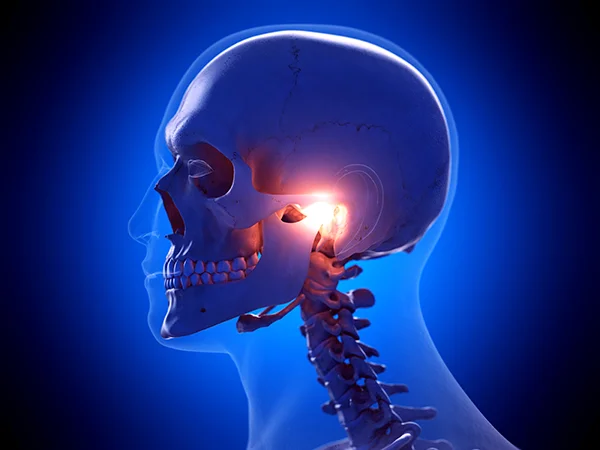TMJ TMJ is the abbreviation for the temporomandibular joint, the intersection where the jaw bone and your skull meet near your ear. A soft disc made of cartilage and highly innervated surrounding tissues acts as a bar between the bones. Multiple small short muscles on the top of this joint allow for movement. With all these small working parts moving together, the jaw can open and close, move forward and backward, and side to side. The mixture of mobility and the innervated tissue running through the TMJ creates many potential avenues of injury and pain. Temporomandibular dysfunction, or TMD for short, encompasses the many disorders of the temporomandibular joint, associated muscles, and nerves surrounding the area. Meet our practitioner at East Portland Dentistry for exceptional dental services. TMJ is the abbreviation for the temporomandibular joint, the intersection where the jaw bone and your skull meet near your ear. A soft disc made of cartilage and highly innervated surrounding tissues acts as a bar between the bones. Multiple small short muscles on the top of this joint allow for movement. With all these small working parts moving together, the jaw can open and close, move forward and backward, and side to side. The mixture of mobility and the innervated tissue running through the TMJ creates many potential avenues of injury and pain. Temporomandibular dysfunction, or TMD for short, encompasses the many disorders of the temporomandibular joint, associated muscles, and nerves surrounding the area. Meet our practitioner at East Portland Dentistry for exceptional dental services.Symptoms and Causes of TMJ DisordersThe most common symptoms of TMJ disorders are pain in the jaw, muscles, face, ear, or neck. Other common symptoms could include jaw locking, popping, grating, or clicking when opening or closing your mouth. If your teeth aren't fitting together well or you've noticed changes in your bite, this too could be a sign of a temporomandibular problem for which you should notify your dentist. TMJ disorders can be caused by trauma in the jaw, arthritis, night clenching, hormonal changes, and disc erosion or displacement. Professionals have estimated that women are 1.5 to 2 times more likely than men to develop TMJ problems, and women of reproductive age bear the higher risk. We advise females to visit our clinic regularly if they have this disorder. Diagnosis and Treatment of TMDDiagnosing TMJ disorders can be a very complicated and intricate process. The doctors at East Portland Dentistry are specially trained to thoroughly examine and order digital imaging of the joint, muscles and nerves involved in TMD. Temporomandibular dysfunction can be as straightforward as muscle strain or more complex such as joint derangement or disc degeneration. Factors such as age, family history, and stress may all play a role in the diagnosis as well. Once an appropriate diagnosis of your TMD is made, our doctors will review options for treatment or perhaps even make a referral to a TMJ specialist. Many of today's treatments for TMD are very conservative. We utilize splint therapy, physical therapy, and a custom regiment of at-home therapy recommendations. Often we will advise a soft diet, anti-inflammatories, hot/cold compresses, and decreased talking/use for a period of time. Most patients with TMD find this is transitory and respond well to treatment, though issues with their TMJ may come and go throughout their lifetime. We are more than happy to schedule an appointment and talk through therapy options with you. Call us at (971) 484-1652. |
 Phone(971) 484-1652 HoursMonday – 8:00 am - 5:00 pm Tuesday – 7:00 am - 5:00 pm Wednesday – 8:00 am - 1:00 pm Thursday – 8:00 am - 6:00 pm Friday – 8:00 am - 5:00 pm |